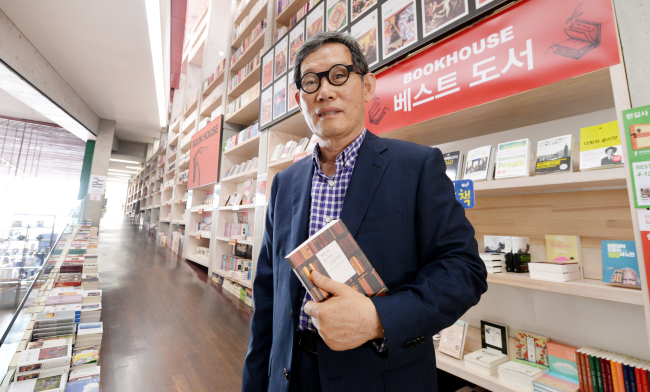After publishing over 3,000 books in the 39 years of his publishing career, Kim Eoun-ho, president of Hangilsa, one of Korea’s leading publishing houses, believes publishing a book is an act of asking how one should live.
Kim attempted to answer this deep probing life question by publishing his own book, “The Forest of Books, Sound of Books.” The book is compiled from his handwritten journals from Jan. 1 to Dec. 31 in 2013, centering on his day-to-day life as a publisher, and stories about 800 different people he met, as they talk and think about the issues facing them at large, including the murky future of publishing industry.
“It is very true that books are in great trouble,” said Kim with a concerned look under his signature black round glasses. “But if you think it another way, it could be an opportunity. We need a movement to use this crisis and turn it into an opportunity, and I call it the ‘reading movement.’”

Kim Eoun-ho, president of the publishing house Hangilsa, poses with his book “The Forest of Books, Sound of Books,” which chronicles his 39 years of publishing. (Park Hyun-koo/The Korea Herald)
As part of the reading movement, he was the one to plan the 24-hour public library “The Forest of Wisdom,” the first of its kind in Korea, which was made possible with donated books by individuals and publishing houses. The library, which opened last month in Paju, Gyeonggi Province, contains 200,000 books and has been attracting thousands of visitors on weekends.
“One of my greatest concerns for young people is their declining knowledge-base,” Kim said. Not many people know about the history and rich traditions of Korea.
“This knowledge doesn’t pile up by scrolling information on a smartphone. Smartphones do provide useful information, but most of it is very shallow. The vast knowledge is hidden inside the chapters of books.”
The publisher believes that books, especially books on humanities, provide sense and sensibility. “Digital devices only lead to a vulnerable soul.”
“If one does not read books, it won’t actually affect their daily lives. But it will have a long-term effect, especially in society. Because creativity derives from reading.
“Recently, ‘creative economy’ has become a catchphrase in Korea. The best way to achieve that creativity, and moreover, endless imagination is through reading because it gives you the strength of blazing a new trail; it also teaches on what an ethical life consists of.”
He calls himself an outsider. He moved to Paju 10 years ago when he was in charge of creating Paju Heyri Art Village, a cultural community with residences, galleries, museums and cafes. He lives inside the village along with many artists, writers and musicians.
“If you live in Seoul, you can’t really see much. From outside, I can get a wider and clearer view of Seoul. A publisher has to have an outsider spirit; it takes a critical mind to carefully examine the society. If you are an insider, you can’t make good books.
“It’s a way to keep me healthy, both mind and body.”
He is not only a penchant for books, but finds joys in calligraphy and photography, which is apparent in his books, enriched with his photographs and caligraphies.
For Kim, the sound of reading is one of the most beautiful sounds in the world, as his book title describes.
“The publishing work I do is to place a beautiful book in the center of our lives and I would like to be part of it as long as I can.”
By Ahn Sung-mi (sahn@heraldcorp.com)






